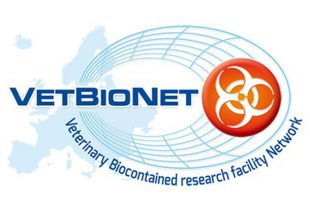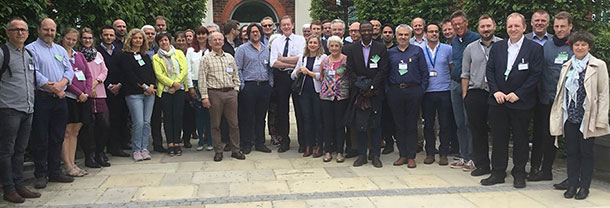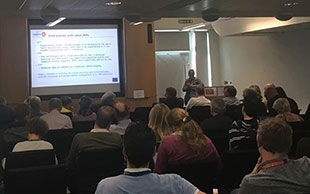Hugh Simmons, APHA's Animal Sciences Veterinary Lead, talks about the VetBioNet EU funded project.
 ‘Free access to large animal high containment facilities and immortality’ - these are just 2 of the offerings of the EU funded VetBioNet project when APHA hosted its first annual meeting in mid-May 2018.
‘Free access to large animal high containment facilities and immortality’ - these are just 2 of the offerings of the EU funded VetBioNet project when APHA hosted its first annual meeting in mid-May 2018.
The project brings APHA together with other veterinary institutes across Europe that have large animal high containment facilities (facilities to house animals infected with dangerous and exotic diseases that pose a high risk to animals and/or man), as well as some outside the EU such as the Department of Homeland Security at Plum Island, USA, and the Australian Animal Health Laboratories at Geelong, Australia.
The meeting, which followed on from the kick-off meeting held by the co-ordinator, the French National Institute for Agricultural Research (INRA) in Tours last year, brought together over 40 visitors representing containment facilities and associated partners, with expertise in fish infectious disease research, immunology, bio-ethics, telemetry and bio-imaging.

After a welcoming address by Kath Webster, APHA’s Director of Scientific Services, there followed a couple of intense days of work - several APHA Scientific (APHA’s commercial arm) staff were involved, and Kath, who contributed to the emergency preparedness plans in the project. The plans involve funding which will be used to provide quick research responses to emerging disease threats to European farmed animals.
The project is split into 3 parts, the first of which looks at co-ordination activities. The emergency preparedness plan is part of this area of work, which also includes:
- biosafety best practice (to achieve accreditation to the expected International Organisation for Standardisation (ISO) standard)
- the ethics involved in this type of research and looking at the social impact of infectious disease research using animals
- its contribution to the EU bio-based economy
The second part looks at joint research activities, which are focused on exotic viruses and includes work packages on developing:
- improved experimental models - APHA is leading on validating a model to replace a statutory test that requires birds for confirming the pathogenicity of avian flu, with one that requires embryonated eggs
- novel analytical tools and reagents to help interrogate the host pathogen interaction
- live animal monitoring, telemetry and bio-imaging to improve the welfare of animals in experiments by identifying adverse effects early on and improving the analysis of the observed effects in-vivo and at post-mortem

The third part of the project looks at trans-national access to facilities, for which it has an infrastructure grant.
This makes up 40% of the project budget and pays partner institutes to allow companies or researchers to use their high containment facilities to undertake research without charge.
There are conditions, such as:
- ensuring the research passes peer review and is approved by the VetBioNet executive committee
- VetBioNet partners cannot apply
- access must not be in the same country as the applicant – for example, if the applicant is from the UK, the research has to be carried out in a facility outside the UK
However, this represents a substantial opportunity for some of our scientific collaborators and is being communicated widely across Europe.
Sadly, the immortality offered under the VetBioNet project is restricted to the provision of transgenic cell lines created by one of the small/medium size enterprise partners - and not for us!
This customisation of gene expression in the cell lines produced allows more targeted research to be carried out – this was of particular interest to the cattle TB research group here at APHA.
Visit the VetBioNet website
.

Recent Comments